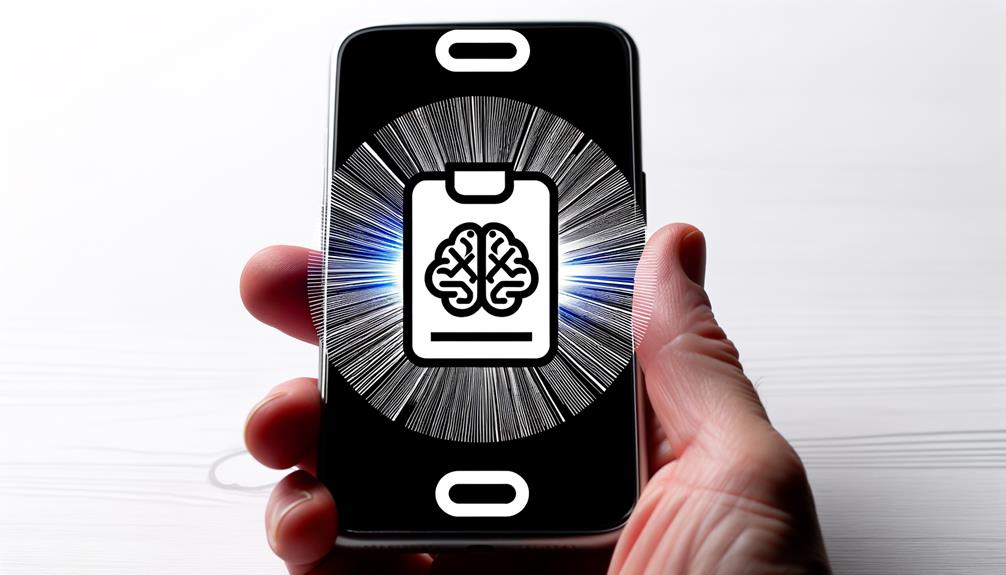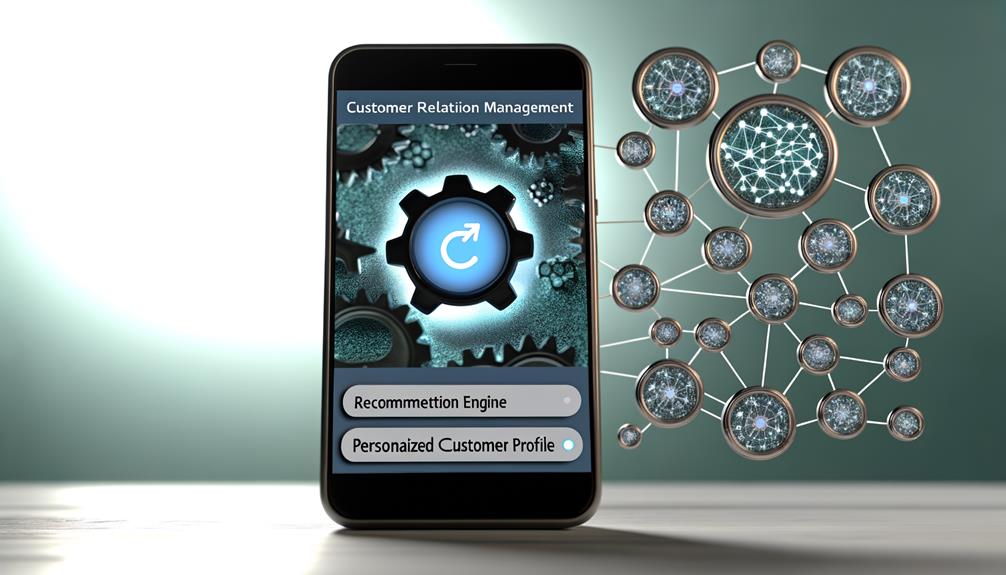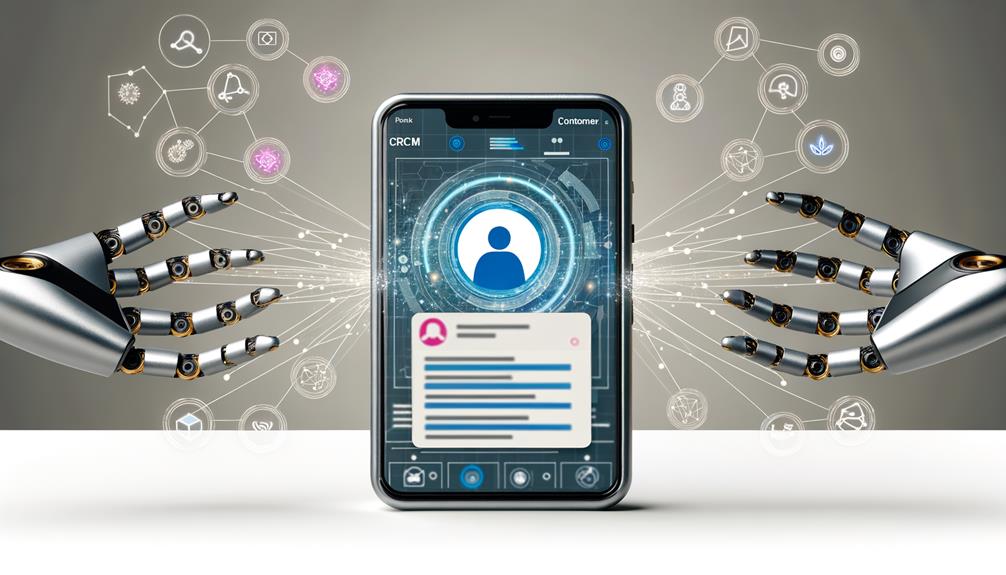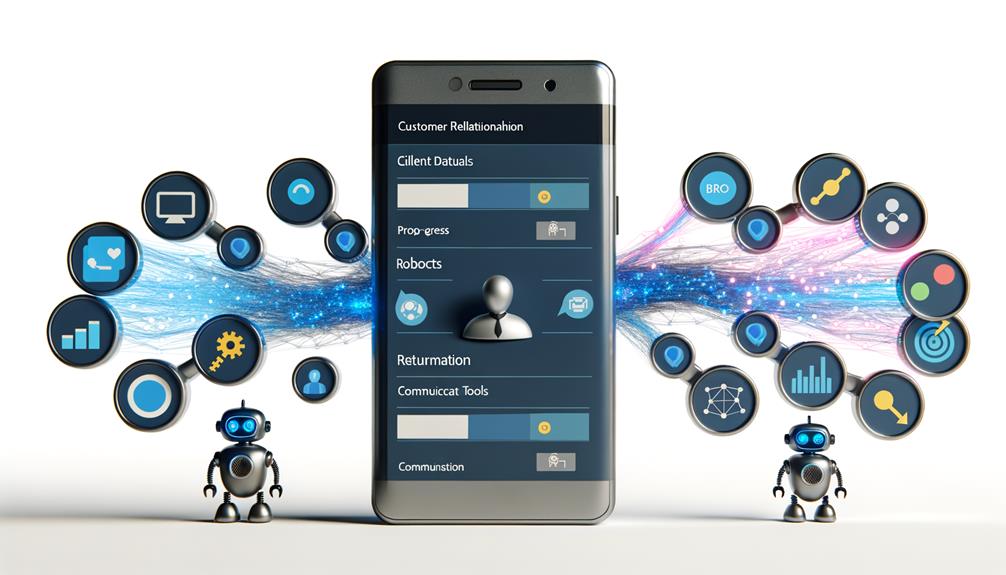Artificial Intelligence (AI) greatly enhances the capabilities of CRM mobile apps. It personalizes user experiences with tailored content and recommendations while automating routine tasks for increased efficiency. Additionally, it uses predictive analytics to anticipate customer behaviors and needs, assisting you in making data-driven decisions. Natural language processing enhances user interactions, making apps more user-friendly. The integration of AI into your CRM toolset can turn it into a crystal ball for customer interactions, fueling targeted marketing campaigns and significantly enhancing your customer relation strategies. Dive deeper, and you'll encounter even more ways to revolutionize your CRM with AI.
Understanding AI in CRM

While you might be familiar with the term CRM, understanding how AI enhances these mobile apps could offer your business a competitive edge. AI technology, including machine learning and NLP, integrates seamlessly with CRM mobile apps to deliver personalized experiences. It analyzes customer interactions, tailoring services based on behavior and preference, which greatly boosts user engagement. AI's predictive analytics anticipates user needs, providing relevant content that further enhances the user experience. Intelligent automation and smart assistance are other features that AI brings to the table, streamlining operations. Additionally, AI-powered chatbots are revolutionizing customer service, providing instant, personalized responses. So, you see, AI's incorporation into CRM isn't just a trend; it's a strategic move to stay ahead in this tech-savvy world.
AI-Powered CRM Mobile Apps

Consider how AI-powered CRM mobile apps can elevate the user interface. By integrating predictive analytics, they offer insights that streamline decision-making. It's a tech-forward approach to CRM that merges user-friendliness with advanced data interpretation.
Enhancing User Interface
In an era of artificial intelligence, CRM mobile apps are harnessing the power of AI to offer intuitive user interfaces that adapt to your unique preferences and behavior. By integrating AI, these apps enhance your experience, providing personalized recommendations based on your interactions. Thanks to AI algorithms, these apps can analyze your usage patterns and optimize the interface for improved usability.
Furthermore, AI-powered CRM mobile apps can automate tasks and streamline workflows to increase your efficiency. They deliver tailored content, driving user engagement, and increasing customer satisfaction.
| AI in CRM Mobile Apps | Impact |
|---|---|
| Personalized Recommendations | Enhances User Experience |
| Automation of Tasks | Increases Efficiency |
| Tailored Content | Boosts User Engagement |
| Streamlined Workflows | Simplifies Processes |
Get ready to experience the future of CRM mobile apps, powered by AI.
Predictive Analytics Integration
Harnessing the power of predictive analytics, AI-powered CRM mobile apps can accurately forecast your customers' behavior and needs based on historical data. These apps utilize machine learning to evaluate leads and predict sales, allowing for data-driven decision-making. With customer segmentation, you can further enhance customer journey mapping and tailor personalized communications. Conversational AI within these apps delivers personalized suggestions, offering human-like interactions that elevate the customer experience. What's more, AI-enabled lead scoring and conversion strategies identify the most promising leads. By tailoring customized approaches, you can enhance your conversion rates to a great extent. So, it's clear that predictive analytics integration in CRM mobile apps enables you to transform your business strategies, making them more effective and efficient.
Predictive Analytics in CRM

Imagine the ability to accurately forecast customer behavior and trends using historical data; that's the power of predictive analytics in CRM. With machine learning algorithms, you can analyze leads and sales data, enabling data-driven decision-making. Predictive analytics can optimize your marketing campaigns, enhancing lead scoring based on customer engagement and behavior, and allowing you to focus on promising leads effectively.
Enhancing Predictive Analytics
Often, you'll find that predictive analytics in CRM, powered by AI, can forecast customer behavior and trends based on historical data, effectively turning your CRM mobile apps into a crystal ball for customer interactions. This AI-powered technology paves the way for data-driven decisions that can fuel targeted marketing campaigns, resulting in more personalized and effective outreach. It's not just about marketing, either. Predictive analytics also sharpens lead scoring accuracy and bolsters sales forecasting, bringing more precision to your business strategies. By leveraging this technology, you're able to anticipate customer needs and personalize interactions, paving the way for tailored customer experiences. In essence, enhancing predictive analytics in your CRM mobile apps provides a proactive approach to understanding and serving your customers.
AI's Role in CRM
Building on this, let's examine how AI plays a pivotal role in CRM, particularly through predictive analytics. AI uses machine learning algorithms to analyze customer data, helping to predict sales outcomes and enhance decision-making.
Let's dive deeper using a simple table:
| Feature | Benefit |
|---|---|
| Predictive Analytics | Forecast customer behavior and trends |
| Machine Learning Algorithms | Analyze leads and predict sales outcomes |
| Customer Segmentation | Enhance personalization through behavior-based groups |
| Conversational AI tools | Offer personalized interactions and recommendations |
| Voice Assistants | Provide quick solutions and address customer queries effectively |
This approach provides personalized interactions, improved customer segmentation, and efficient responses via voice assistants. Ultimately, AI is the driving force in CRM, providing valuable insights and enhancing customer engagement.
Role of Natural Language Processing

In the domain of CRM mobile apps, Natural Language Processing (NLP) plays a pivotal role in enhancing user interactions by enabling apps to understand and respond to human language in a more natural and intuitive manner. By integrating artificial intelligence with NLP, you're able to analyze and interpret customer data, resulting in a smoother customer relationship. Voice assistants like Siri and Google Assistant rely on NLP to comprehend and execute voice commands, hence enhancing user experience. Moreover, NLP empowers chatbots and virtual assistants within your mobile app, providing a user-friendly communication channel. This smart use of technology results in streamlined user interactions and improved app usability. So, the role of NLP in CRM mobile apps cannot be understated – it's a game changer.
Personalization With Recommendation Engines

While NLP greatly enhances user interaction, there's another AI-powered tool that takes customer satisfaction to a new level: recommendation engines. They analyze user data in real-time, delivering tailored content that increases user engagement. This personalization in your mobile app can boost satisfaction by offering hyper-targeted experiences based on user behavior. Imagine a tool that suggests relevant articles, products, or music to you based on your past behavior – that's the power of AI. Recommendation engines predict your preferences through collaborative filtering algorithms, further improving content relevance. This level of personalized experience resonates with users, driving higher satisfaction and fostering loyalty. The key takeaway? AI-enhanced personalization with recommendation engines is a game-changer in creating engaging, satisfying user experiences.
Intelligent Automation in CRM

Diving into the world of intelligent automation in CRM, you'll find it's not just about streamlining workflows; it's also about enhancing productivity and efficiency through automation of repetitive processes. AI-enabled intelligent automation simplifies complex tasks, which not only saves time but also greatly boosts efficiency. With such automation, CRM becomes a breeze, offering a notable uptick in user productivity.
Moreover, the advent of AI has led to the integration of smart assistants within CRM. These assistants, powered by AI, provide proactive recommendations based on user behavior, thereby facilitating informed business decisions. They're like your personal helpers, making tasks easier and quicker. In essence, intelligent automation in CRM empowers you to accomplish more, with less effort, optimizing your workflows and business processes.
Real-World AI CRM Applications

Exploring real-world AI CRM applications, you'll discover that solutions like Salesforce Einstein GPT and HubSpot's ChatSpot aren't just fancy tech buzzwords—they're transformative tools harnessing the power of predictive analytics, personalized marketing, and AI-based sales assistance to optimize resources, boost conversion rates, and future-proof businesses. These AI-powered CRM applications leverage advanced technologies like GPT-4 and DALLE-2 for more effective, efficient customer management. Take Zoho CRM's Zia, for instance. This AI conversational assistant enhances customer interactions, leading to more satisfied customers and higher sales. Then there's the efficiency boost from AI Cloud solutions, which streamline processes and eliminate time-wasting tasks. Real-world AI CRM applications are not about replacing humans, but about augmenting their capabilities and driving business growth.
Measuring ROI of AI CRM

After utilizing the power of AI in CRM applications, you're probably keen to quantify the benefits—let's talk about how to measure the return on investment (ROI) of AI CRM.
- Customer Satisfaction: Track improvements in customer interactions and satisfaction. AI can enhance these metrics substantially.
- Automation and Cost Savings: Evaluate the savings from automating routine tasks, which also frees up human resources for more strategic work.
- Efficiency and Accuracy: Monitor efficiency gains in lead prioritization and sales forecasting. Also, keep an eye on the improvements in data accuracy.
- Operational Impact: Measure the operational impact by tracking increased sales, upselling, and data-driven decision-making. These metrics can provide a clear picture of AI CRM's ROI.
Future of AI in CRM Mobile Apps

Looking ahead, AI's role in CRM mobile apps is poised to revolutionize user experience by offering personalized, predictive interactions based on user behavior. AI technologies like NLP and machine learning are being integrated into mobile apps, providing smarter services. They're able to analyze customer data, delivering tailored content and enhancing productivity through intelligent automation. Predictive analytics anticipate your needs, improving engagement and satisfaction. AI in CRM also includes recommendation engines, which analyze user behavior to offer real-time, personalized suggestions. This combination of AI technologies in CRM mobile apps promises a future of more intuitive and efficient user experiences, transforming how businesses interact with their customers and how you manage your relationships. The future of CRM is unquestionably AI-driven.



